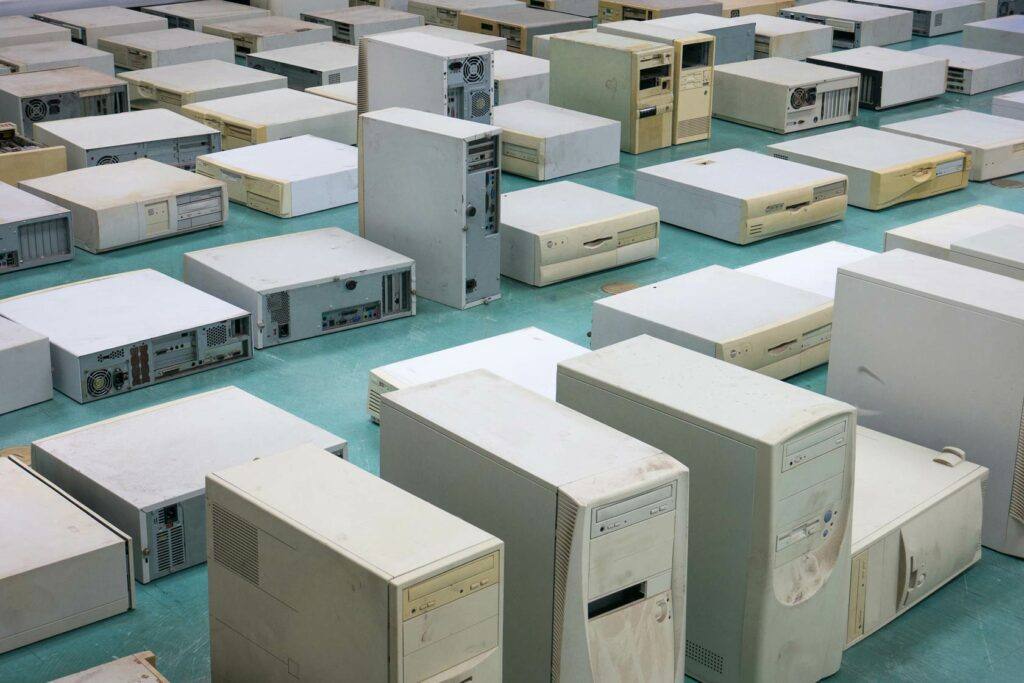The electronics recycling and IT asset disposition (ITAD) industry has unfortunately suffered from a few black eyes since its inception. At fault have been a small number of businesses that sought to generate profit from electronics recycling without due diligence as to the environmental, health, safety, and liability risks incurred when processing this material. A common practice among these uncertified electronics recyclers was to simply ship their electronic waste overseas, sometimes even hidden in shipments of other goods, where environmental and human safety laws are more lax but the damage is kept far out of sight or knowledge of clients.
The risks posed by this practice are not to be taken lightly. Used electronics change hands multiple times in transit and end up in overseas “graveyards” to be picked through by strangers. The businesses that relied on their electronic recycler to responsibly handle their assets are instead open to costly and embarrassing exposure for their brands and data. Choosing an R2 Certified company as your ITAD partner is one easy and important step you can take to protect your business and brand.
What is an R2 Certification?
R2 stands for Responsible Recycling and is a standard specifically created for the electronics recycling industry by Sustainable Electronics Recycling International (SERI). SERI is the housing body and ANSI-accredited Standards Development Organization for the R2 Standard: Responsible Recycling Practices for Use in Accredited Certifications Programs.
Stakeholders who contributed to the creation of these standards include the U.S. Environmental Protection Agency (the EPA was responsible for a study of the implementation of the R2 standards); regulators from state agencies; electronics recyclers, refurbishers, and their trade associations; OEMs/customers of electronics recycling services; and non-governmental organizations.
The standards were then accredited by ANAB, and in 2008, R2 was released. R2 Certification is international, and the standards and guidance have been made available in five languages.
Core Requirements of the R2 Certification:
1 – Scope
2 – Hierarchy of Responsible Management Strategies – R2 certified recyclers must have a written policy pledging to prioritize Reuse and Recovery options for material before considering less desirable solutions like incineration and landfilling, which is only allowed “if no reuse or recycling options are viable.”
3 – Environmental, Health, and Safety Management Systems – All R2 Certified recyclers must have a separate EHS system, such as ISO or RIOS. Cobalt is RIOS certified.
4 – Legal & Other Requirements
5 – Tracking Throughput
6 – Sorting, Categorization & Processing
7 – Data Security – this requirement sets stipulations on types of data-bearing devices and best practices for ensuring that they are data-free through destruction and sanitization
8 – Focus Materials – this provision stipulates various requirements for qualifying downstream vendors
9 – Facility Requirements
10 – Transport Requirements
How Cobalt Obtained R2 Certification
Cobalt’s Middletown, Ohio facility has been continuously R2 Certified and compliant since 2014. The certification process involves a multi-step audit by a SERI-approved certifying body, including site visits, personnel interviews, documentation review, and opportunities for corrective action to bring all parts of an operation into compliance.
R2 Certification is fully re-audited every three years, with shorter surveillance audits performed in the interim years. Only facilities that conform to all provisions of the standard, are current on all required audits and oversight, and have completed all necessary paperwork and payments to SERI are permitted to claim R2 Certification for electronics recycling and ITAD.
A requirement of R2 practice is that the certificate holder is also certified to an approved Environmental Health & Safety system. Cobalt’s EHS system is certified by RIOS, a standard created specifically for the recycling industry.
Why Does This Certification Set Cobalt Apart?
Cobalt was among the earliest electronics recyclers to pursue R2 Certification. Out of the requirements covered by R2, the ones we think make the most difference to our clients are those that hold us accountable for prioritizing reuse and recovery, vetting our downstream vendors, and ensuring total data destruction or sanitization.
What got some of those bad-actor electronics recyclers in trouble was prioritizing quick and easy profit over responsibility and sustainability. Before regulations and certifications, there was no incentive to take accountability for their clients’ data or their downstream vendors, nor to put in the effort to refurbish and remarket equipment that was still valuable and useful. Anyone can fill a shipping container with computers and send them out of sight and out of mind. A recycler or ITAD provider who has gone through the process to receive and maintain R2 Certification has shown themselves to take their responsibility and dedication to clients seriously and to see the bigger picture of electronics recycling and IT security.
R2 Certification is expensive and time-consuming. Any e-waste recycler or ITAD provider who offers to take your assets for free or pay you for them, no questions asked and no paper trail to follow, is very unlikely to have invested the time and effort into certification. Always ask to see evidence of certification if you’re suspicious.
Why Your Business Should Partner with a Certified Recycler
Choosing an R2 Certified electronics facility gives you greater control of your liability and risks to your business, data, and brand. We know you don’t want to have to worry where your business’s electronic equipment ends up once you are done using it, or about picking through all your inventory to figure out where the value is. Work with an R2 Certified recycler to get peace of mind that all of your risks are covered and you’ll never be surprised by fines or unflattering press coverage because your assets wound up in the wrong hands.
What Other Certifications Should My ITAD Partner Have?
The other leading certification in the electronics recycling world to look out for is e-Stewards, which was created by the Basel Action Network in 2006. It covers similar provisions to R2 with some additional stipulations applicable to international recyclers. R2 and e-Stewards certifications are both valid and robust accreditations, and your electronics recycler should ideally carry at least one of them. The EPA does not compare or draw conclusions about the implementation of either standard.
Why Choose Cobalt
Cobalt understands the complex regulatory environment that modern businesses face, and the weight of your liability to those regulations at the same time that you are accountable to your customers, your brand, and your bottom line. Our goal is to give you peace of mind by eliminating or mitigating those risks and driving revenue back to your business through responsible reuse and recovery. Contact us to discuss your unique risk situation and how Cobalt is positioned to help





